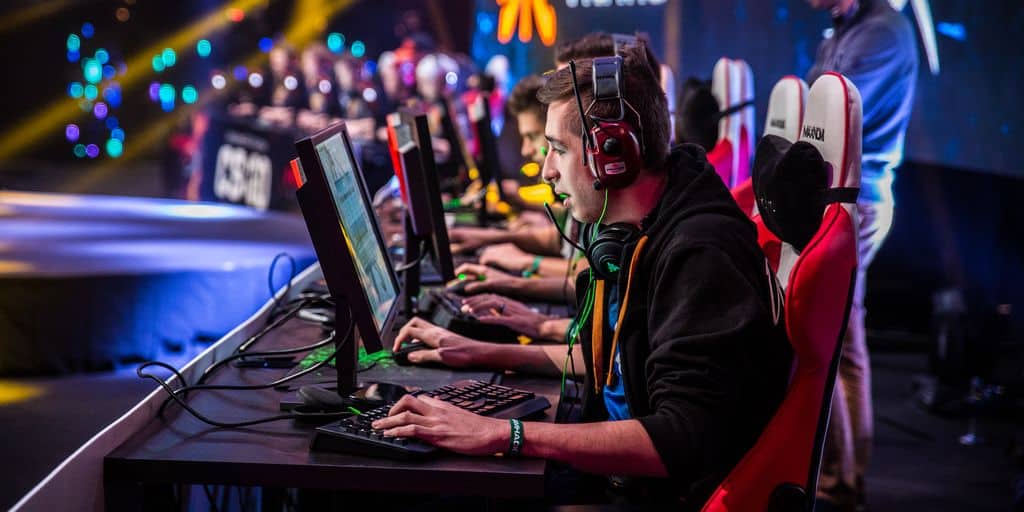In the early days of video games, few could have predicted that competitive gaming would evolve into the multibillion-pound industry we now know as esports. From modest beginnings in arcade halls to massive tournaments filling stadiums worldwide, the trajectory of esports represents one of the most remarkable cultural shifts in entertainment history. Today, we’re examining this fascinating evolution and exploring why competitive gaming has captured the hearts and minds of millions across the globe.
The Foundations of Competitive Gaming
Competitive gaming didn’t begin with high-production broadcasts and million-pound prize pools. Its roots trace back to the late 1970s and early 1980s, when players gathered around arcade cabinets to challenge one another in games like Space Invaders and Pac-Man. These informal competitions laid the groundwork for what would eventually become organized esports tournaments.
“When we look back at gaming history, those early arcade competitions were the true birthplace of esports culture,” says Aaron Connolly, co-founder of WhatIsEsports. “Players weren’t competing for money or fame—they played for pride and the simple joy of being recognized as the best. That core competitive spirit hasn’t changed, even as the industry has grown exponentially around it.”
The transition from arcade competitions to formal esports tournaments happened gradually. The 1990s saw the emergence of fighting games like Street Fighter II, which fostered competitive communities and small-scale tournaments. Meanwhile, the rise of PC gaming and internet connectivity allowed players to compete remotely, expanding the potential player base and audience. For newcomers wondering how to watch esports today, the options have grown far beyond these humble beginnings.
From LAN Parties to Global Spectacles
The late 1990s and early 2000s marked a crucial turning point for competitive gaming. LAN parties—where players would connect their computers in the same physical location—evolved into more structured competitions with defined rulesets and prizes. Games like Quake, StarCraft, and Counter-Strike developed vibrant competitive scenes that attracted dedicated players and spectators alike, establishing many of today’s popular esports games.
As internet speeds improved and streaming technology advanced, watching others play video games became increasingly accessible. The launch of Twitch (originally Justin.tv) in 2011 revolutionized how people consumed gaming content, providing a platform for tournaments to reach viewers worldwide without the limitations of traditional broadcasts, fundamentally changing how to watch esports.
This accessibility transformed esports from a niche interest into mainstream entertainment. Today, major tournaments for games like League of Legends, Dota 2, and Counter-Strike 2 regularly attract millions of viewers—numbers that rival or exceed many traditional sporting events, challenging conventional notions about the differences between esports and traditional sports.
The Business of Esports
The economic growth of esports has been nothing short of remarkable. What began as grassroots competitions with modest prize pools has evolved into a complex ecosystem involving publishers, teams, sponsors, broadcasters, and investors.
Major corporations from both inside and outside the gaming industry have recognized the value of the esports audience—typically young, tech-savvy consumers who are often difficult to reach through traditional advertising. Brands like Red Bull, BMW, and Louis Vuitton have established significant partnerships within esports, legitimizing the industry in the eyes of mainstream business.
The monetization models in esports continue to diversify. Revenue streams now include media rights, merchandise, ticket sales, and in-game purchases, creating a sustainable economic framework that supports the growth of professional teams and leagues.
James Connolly, co-founder of WhatIsEsports, notes: “The business side of esports has matured dramatically in the past decade. We’ve moved beyond the days when teams relied solely on tournament winnings to survive. Today’s esports organisations operate more like traditional sports franchises, with diversified revenue streams, professional management, and long-term strategic planning. This business evolution has been crucial for the stability and continued growth of the competitive gaming ecosystem.”
The Professionalization of Players
Perhaps the most significant evolution in esports has been the professionalization of players. Early competitive gamers often balanced their passion with education or conventional employment, playing tournaments when possible. Today, being an esports athlete is a legitimate career path with salaries, benefits, and support staff.
Professional players now train with the same rigor as traditional athletes. They work with coaches, analysts, nutritionists, and mental health professionals to optimize their performance. Training facilities rival those of conventional sports teams, with state-of-the-art equipment and dedicated spaces for practice, strategy sessions, and physical conditioning.
The career path for esports professionals has also expanded beyond competition. Former players now work as coaches, analysts, commentators, content creators, and team managers, creating a sustainable ecosystem that allows talent to remain in the industry even after their competitive careers end.
Esports in the Cultural Mainstream
The cultural acceptance of esports represents another significant evolution. Once dismissed as a frivolous activity, competitive gaming now receives coverage from mainstream media outlets, recognition from educational institutions, and acknowledgment from traditional sports organisations.
Universities worldwide now offer esports scholarships, recognizing the skill, dedication, and teamwork required to excel in competitive gaming. Some educational institutions have even developed curriculum around esports business, production, and performance, preparing students for careers in this growing industry.
The Olympics and other major sporting bodies have begun exploring partnerships with esports, though debates continue about whether competitive gaming belongs alongside traditional athletic competitions. Regardless, these discussions highlight how esports has forced a reconsideration of what constitutes legitimate competition in the modern era.
The Future of Competitive Gaming
As we look to the future, several trends suggest continued evolution for esports. Mobile gaming has opened new markets, particularly in regions where PC and console ownership is less common. Games like PUBG Mobile and Mobile Legends have developed massive competitive scenes, especially in Southeast Asia and South America.
Virtual reality presents another frontier, with the potential to create more immersive experiences for both competitors and spectators. Meanwhile, the integration of blockchain technology and NFTs offers new models for ownership, monetization, and fan engagement.
The regionalization of esports also continues to develop, with local leagues and tournaments fostering grassroots competition while feeding talent into international events. This structure mirrors traditional sports and creates sustainable pathways for player development.
The GTA 6 Phenomenon: Anticipation and Impact on Gaming Culture
No discussion of gaming’s cultural impact would be complete without acknowledging the unprecedented anticipation surrounding Grand Theft Auto 6. Recently, Rockstar Games announced a delay of this highly anticipated title to May 26, 2026, showcasing how even gaming’s biggest franchises must prioritize quality over release schedules in today’s competitive market.
The delay of GTA 6 represents a fascinating case study in how major gaming releases can reshape the entire industry landscape. Publishers have been strategically planning their release schedules around GTA 6, with many deliberately avoiding proximity to its launch window. This “meteor” effect, as some industry insiders call it, demonstrates the gravitational pull that blockbuster releases exert on the gaming ecosystem.
“The anticipation around GTA 6 exemplifies how gaming has evolved beyond just entertainment into cultural landmarks that define generations,” explains Aaron Connolly. “While it’s not traditionally considered an esports title, its eventual online component will likely influence competitive gaming structures and streaming content for years to come.”
From an esports perspective, the GTA franchise has historically maintained a complex relationship with competitive gaming. Though not designed primarily as an esports title, GTA Online has fostered competitive communities and tournaments. The upcoming GTA 6 may further bridge the gap between narrative-driven open-world experiences and competitive play, potentially introducing competitive modes that could establish new paradigms for what constitutes an “esports game.”
The delay also highlights the broader trend of increasing development timelines for triple-A games, reflecting the growing complexity and scale of modern gaming experiences. This extended development cycle creates opportunities for more agile esports titles to capture audience attention in the interim, particularly games designed specifically for competitive play from the ground up.
James Connolly notes: “The gaming industry’s calendar effectively revolves around these tentpole releases. For emerging esports titles and tournaments, understanding this rhythm is crucial—there are strategic advantages to launching during these ‘gaps’ when the community’s attention isn’t dominated by blockbuster releases. Smart esports organisers are already adjusting their 2026 calendars in response to the GTA 6 announcement.”
This dynamic relationship between major game releases and competitive gaming schedules illustrates how interconnected the gaming ecosystem has become. Even titles not explicitly designed for esports can dramatically influence competitive gaming’s landscape through their impact on audience attention, streamer content, and platform priorities.
Conclusion: A Cultural Force
The evolution of esports from niche hobby to global phenomenon reflects broader shifts in entertainment, technology, and cultural values. As digital natives become the primary consumers of media and entertainment, competitive gaming naturally assumes greater prominence in the cultural landscape.
What makes esports particularly significant is how it blends competition, community, and technological innovation. Unlike traditional sports, esports continuously evolves as new games emerge and existing ones update. This constant renewal helps maintain relevance and excitement in a rapidly changing digital world.
For those looking to understand this fascinating cultural shift more deeply, WhatIsEsports offers comprehensive guides to the most popular competitive games, insights into tournament structures, and analysis of the business driving the industry forward. Their articles on popular esports games, how to watch esports, and esports vs traditional sports provide excellent entry points for newcomers curious about competitive gaming.
As esports continues to evolve, one thing remains certain: competitive gaming has permanently altered the entertainment landscape, creating new opportunities for players, businesses, and fans to connect through the shared passion of digital competition. Far from being a passing trend, esports represents a fundamental shift in how future generations will understand competition, community, and sport.





























